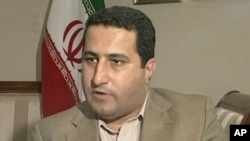Iran says a nuclear scientist whose disappearance has prompted competing claims of defection and abduction is on his way home from the United States.
Iranian officials are hailing the return of Shahram Amiri one day after he showed up at the Iranian interests section of the Pakistan embassy in Washington seeking refuge and repatriation.
Deputy Foreign Minister Hassan Qashqavi says the nuclear scientist should arrive in Tehran Thursday. Before arriving in Iran, he made a transit stop in Qatar. Qashqavi adds he will be welcomed on his return home.
Debriefing
What that welcome will consist of raises a new round of questions in a case already shrouded in mystery, with no clear answers as to the where and why's of Amiri's movements in the year since he disappeared during a pilgrimage in Saudi Arabia.
In a series of video messages in recent weeks, a man claiming to be Amiri first said he was kidnapped by U.S. agents. He then said he came to America to pursue academic studies, and in a third, that he had eluded his U.S. captors.
His abduction
In an interview Tuesday, Amiri described what he said was his abduction in Saudi Arabia last June.
The scientist said he was held at gunpoint by intelligence forces.
U.S. officials denied kidnapping Amiri, saying he was in the U.S. of his own free will, and that he was free to go whenever he wanted.
Conflicting stories
U.S. media are quoting unidentified American officials as saying Amiri had defected, with the aim of helping Washington learn more about Iran's controversial nuclear program. But even these accounts differ as to why he was returning now. Some speculate that Amiri had second thoughts, that he was concerned for the safety of his family in Iran, that he had given over all the information that he had or some combination of those possibilities.
Many of those following the case say they are looking to see what lies ahead for Amiri in Iran, not just in the weeks ahead but in the coming years, with the possibilities ranging from punishment for a scientist who may have reconsidered his defection to the U.S., to a swap for three Americans currently in prison in Iran, to a hero's welcome for a man who says he escaped from capture by the CIA.
Iran: Missing Scientist On His Way Home












